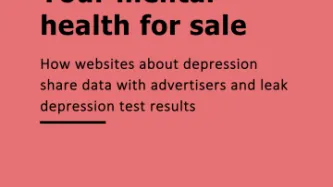Search
Content type: Long Read
IntroductionHarnessing new digital technology to improve people’s health is now commonplace across the world. Countries and international organisations alike are devising digital health strategies and looking to emerging technology to help solve tricky problems within healthcare. At the same time, more and more start-ups and established tech companies are bringing out new, and at times innovative, digital tools aimed at health and wellbeing.
Content type: Long Read
Table of contentsIntroductionWeighing the (potential) benefits with the risksPrivacy rights and the right to healthThe right to healthPrivacy, data-protection and health dataThe right to health in the digital contextWhy the drive for digitalImproved access to healthcarePatient empowerment and remote monitoringBut these same digital solutions carry magnified risks…More (and more connected) dataData leaks and breachesData sharing without informed consentProfiling and manipulationTools are not…
Content type: Advocacy
Privacy International (PI) welcomes the opportunity to provide input to the forthcoming report the Special Rapporteur on contemporary forms of racism, racial discrimination, xenophobia and related tolerance to the 56th session of Human Rights Council which will examine and analyse the relationship between artificial intelligence (AI) and non-discrimination and racial equality, as well as other international human rights standards.AI applications are becoming a part of everyday life:…
Content type: Long Read
Following a series of FOI requests from Privacy International and other organisations, the Department of Health and Social Care has now released its contract with Amazon, regarding the use of NHS content by Alexa, Amazon’s virtual assistant. The content of the contract is to a big extent redacted, and we contest the Department of Health’s take on the notion of public interest.
Remember when in July this year the UK government announced a partnership with Amazon so that people would now…
Content type: News & Analysis
Photo by Ray Witlin / World Bank CC BY-NC-ND 2.0
This article has been written by Ambika Tandon, Policy Officer at the Centre for Internet and Society, in collaboration with Privacy International.
On October 17th 2019, the UN Special Rapporteur (UNSR) on Extreme Poverty and Human Rights, Philip Alston, released his thematic report on digital technology, social protection and human rights. Understanding the impact of technology on the provision of social protection – and, by extent, its…
Content type: Long Read
A new study by Privacy International reveals how popular websites about depression in France, Germany and the UK share user data with advertisers, data brokers and large tech companies, while some depression test websites leak answers and test results with third parties. The findings raise serious concerns about compliance with European data protection and privacy laws.
This article is part of a research led by Privacy International on mental health websites and tracking. Read our…
Content type: Report
The full report of Privacy International's study on how popular websites about depression in France, Germany and the UK share user data with advertisers, data brokers and large tech companies, while some depression test websites leak answers and test results with third parties. The findings raise serious concerns about compliance with European data protection and privacy laws.
Content type: Long Read
Photo by David Werbrouck on Unsplash
This is an ongoing series about the ways in which those searching for abortion information and procedures are being traced and tracked online. This work is part of a broader programme of work aimed at safeguarding the dignity of people by challenging current power dynamics, and redefining our relationship with governments, companies, and within our own communities. As an enabling right, privacy plays an important role in supporting the exercise of…
Content type: Examples
In February 2019, an anonymous tip-off to Computer Sweden revealed that a database containing recordings of 170,000 hours of calls made to the Vårdguiden 1177 non-emergency healthcare advice line was left without encryption or password protection on an open web server provided by Voice Integrate Nordic AB. After the breach was discovered, MedHelp, which runs the 1177 service, shut the server down and found that 55 call files had been illegally downloaded from seven different IP addresses. Nine…
Content type: Examples
In January 2019, it was discovered that the HIV-positive status of 14,200 people in Singapore, as well as their identification numbers and contact details, had been leaked online. According to a statement of the Ministry of Health, records leaked include 5,400 Singaporeans diagnosed as HIV-positive before January 2013, and 8,800 foreigners diagnosed before December 2011. Patient names, identification numbers, phone numbers, addresses, HIV test results and medical information was included in the…
Content type: Long Read
The Privacy International Network is celebrating Data Privacy Week, where we’ll be talking about how trends in surveillance and data exploitation are increasingly affecting our right to privacy. Join the conversation on Twitter using #dataprivacyweek.
It is often communities who are already the most marginalised who are at risk because of the privacy invasions of data-intensive systems. Across the globe, we see the dangers of identity systems; the harms of online violence against women and the…










